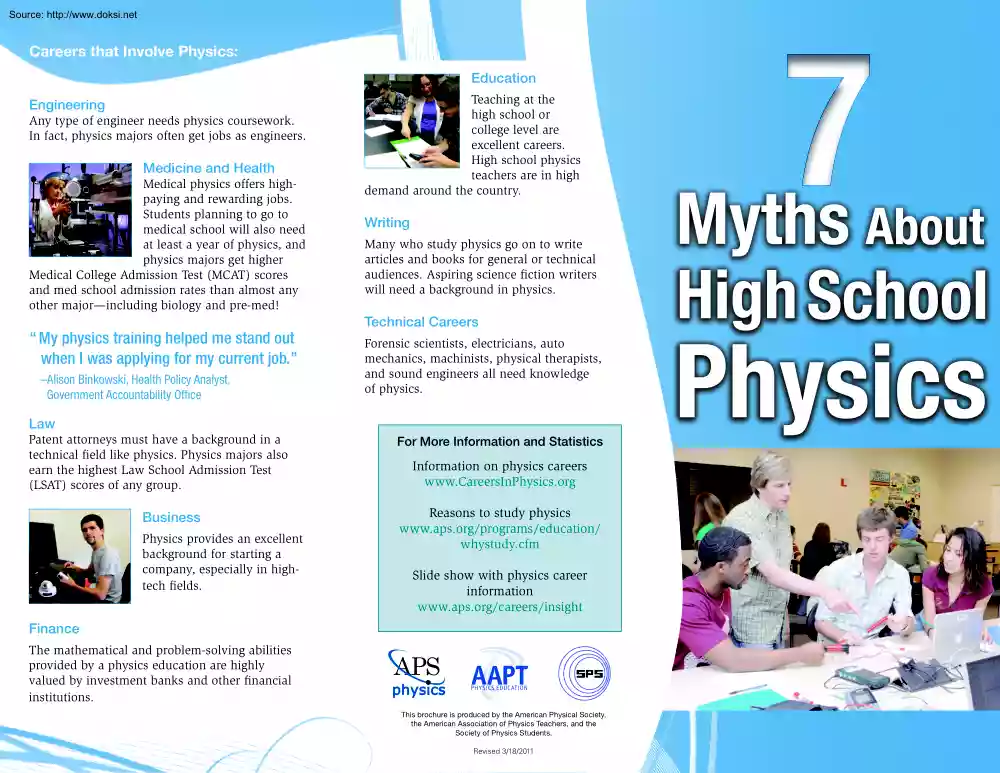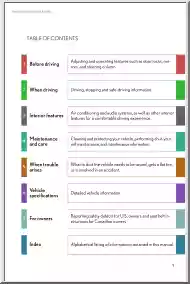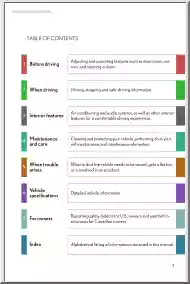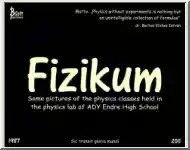Please log in to read this in our online viewer!

Please log in to read this in our online viewer!
No comments yet. You can be the first!
What did others read after this?
Content extract
Source: http://www.doksinet Careers that Involve Physics: Education Engineering Any type of engineer needs physics coursework. In fact, physics majors often get jobs as engineers. Medicine and Health Medical physics offers highpaying and rewarding jobs. Students planning to go to medical school will also need at least a year of physics, and physics majors get higher Medical College Admission Test (MCAT) scores and med school admission rates than almost any other majorincluding biology and pre-med! “ My physics training helped me stand out when I was applying for my current job.” –Alison Binkowski, Health Policy Analyst, Government Accountability Office Teaching at the high school or college level are excellent careers. High school physics teachers are in high demand around the country. Writing Many who study physics go on to write articles and books for general or technical audiences. Aspiring science fiction writers will need a background in physics. Technical Careers
Forensic scientists, electricians, auto mechanics, machinists, physical therapists, and sound engineers all need knowledge of physics. Law Patent attorneys must have a background in a technical field like physics. Physics majors also earn the highest Law School Admission Test (LSAT) scores of any group. Business Physics provides an excellent background for starting a company, especially in hightech fields. For More Information and Statistics Information on physics careers www.CareersInPhysicsorg Reasons to study physics www.apsorg/programs/education/ whystudy.cfm Slide show with physics career information www.apsorg/careers/insight Finance The mathematical and problem-solving abilities provided by a physics education are highly valued by investment banks and other financial institutions. This brochure is produced by the American Physical Society, the American Association of Physics Teachers, and the Society of Physics Students. Revised 3/18/2011 Source: http://www.doksinet MYTH
NO. 1 MYTH NO. Physics will lower students’ GPAs and hurt their chances of getting into college. The only careers you can have with a physics degree are to be a professor or teach high school. FACT: Colleges want to see that students FACT: Physics opens doors to a wide variety have taken a challenging curriculum, and a B in physics is often better than an A in a less challenging course. “ College admission is never just about the GPA. A transcript with physics is better than one without it.” –Vikki Otero, Senior Assistant Director, University of Colorado Admissions Office MYTH NO. 2 Students won’t miss out on future opportunities or experiences if they don’t take physics. FACT: Physics answers questions about the world that no other field can. In addition, not taking physics closes doors to a huge number of potential careers. MYTH NO. 3 Only the most mathematically advanced students can handle physics. FACT: Physics can be taught at a variety of levels for
students with different mathematical backgrounds. All students should have the chance to spark their curiosity with physics. 7 of excellent careers. Physics majors have high employment rates and are among the best paid of all college graduates. MYTH NO. 4 Physics is for boys. FACT: Over 600,000 girls take high school physics each year, nearly half of the nation’s enrollment. MYTH NO. 5 Students don’t need to take physics in high school because they can just take it in college. FACT: Research shows that students who have taken high school physics do better in college physics courses, which are required for a large number of degree paths. MYTH NO. 6 Physics knowledge has little relevance to the world we live in or to most jobs. FACT: Physics is fundamental to every other science and to most major technological innovations of the past century. Moreover, physics teaches critical thinking and problem solving skills that are useful no matter what a student goes on to do.
Careers that Involve Physics: Typical Salary Offers by Campus Recruiters Bachelor's Field Computer Science Electrical Engineering Physics Mathematics Civil Engineering Finance Accounting Chemistry Biology / Lifescience 0 10 20 30 40 50 60 70 80 Starting Salary in Thousands Typical salaries are the middle 50%, i.e between the 25th and 75th percentiles Sources: American Institute of Physics; National Association of Colleges and Employers
Forensic scientists, electricians, auto mechanics, machinists, physical therapists, and sound engineers all need knowledge of physics. Law Patent attorneys must have a background in a technical field like physics. Physics majors also earn the highest Law School Admission Test (LSAT) scores of any group. Business Physics provides an excellent background for starting a company, especially in hightech fields. For More Information and Statistics Information on physics careers www.CareersInPhysicsorg Reasons to study physics www.apsorg/programs/education/ whystudy.cfm Slide show with physics career information www.apsorg/careers/insight Finance The mathematical and problem-solving abilities provided by a physics education are highly valued by investment banks and other financial institutions. This brochure is produced by the American Physical Society, the American Association of Physics Teachers, and the Society of Physics Students. Revised 3/18/2011 Source: http://www.doksinet MYTH
NO. 1 MYTH NO. Physics will lower students’ GPAs and hurt their chances of getting into college. The only careers you can have with a physics degree are to be a professor or teach high school. FACT: Colleges want to see that students FACT: Physics opens doors to a wide variety have taken a challenging curriculum, and a B in physics is often better than an A in a less challenging course. “ College admission is never just about the GPA. A transcript with physics is better than one without it.” –Vikki Otero, Senior Assistant Director, University of Colorado Admissions Office MYTH NO. 2 Students won’t miss out on future opportunities or experiences if they don’t take physics. FACT: Physics answers questions about the world that no other field can. In addition, not taking physics closes doors to a huge number of potential careers. MYTH NO. 3 Only the most mathematically advanced students can handle physics. FACT: Physics can be taught at a variety of levels for
students with different mathematical backgrounds. All students should have the chance to spark their curiosity with physics. 7 of excellent careers. Physics majors have high employment rates and are among the best paid of all college graduates. MYTH NO. 4 Physics is for boys. FACT: Over 600,000 girls take high school physics each year, nearly half of the nation’s enrollment. MYTH NO. 5 Students don’t need to take physics in high school because they can just take it in college. FACT: Research shows that students who have taken high school physics do better in college physics courses, which are required for a large number of degree paths. MYTH NO. 6 Physics knowledge has little relevance to the world we live in or to most jobs. FACT: Physics is fundamental to every other science and to most major technological innovations of the past century. Moreover, physics teaches critical thinking and problem solving skills that are useful no matter what a student goes on to do.
Careers that Involve Physics: Typical Salary Offers by Campus Recruiters Bachelor's Field Computer Science Electrical Engineering Physics Mathematics Civil Engineering Finance Accounting Chemistry Biology / Lifescience 0 10 20 30 40 50 60 70 80 Starting Salary in Thousands Typical salaries are the middle 50%, i.e between the 25th and 75th percentiles Sources: American Institute of Physics; National Association of Colleges and Employers




